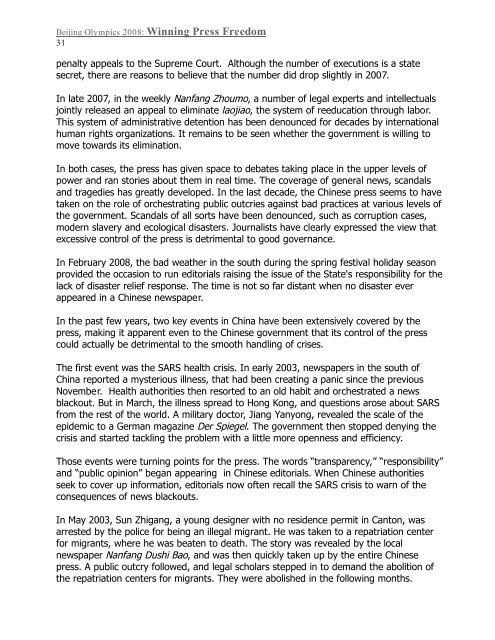Beijing Olympics 2008: Winning Press Freedom - World Press ...
Beijing Olympics 2008: Winning Press Freedom - World Press ...
Beijing Olympics 2008: Winning Press Freedom - World Press ...
Create successful ePaper yourself
Turn your PDF publications into a flip-book with our unique Google optimized e-Paper software.
<strong>Beijing</strong> <strong>Olympics</strong> <strong>2008</strong>: <strong>Winning</strong> <strong>Press</strong> <strong>Freedom</strong><br />
31<br />
penalty appeals to the Supreme Court. Although the number of executions is a state<br />
secret, there are reasons to believe that the number did drop slightly in 2007.<br />
In late 2007, in the weekly Nanfang Zhoumo, a number of legal experts and intellectuals<br />
jointly released an appeal to eliminate laojiao, the system of reeducation through labor.<br />
This system of administrative detention has been denounced for decades by international<br />
human rights organizations. It remains to be seen whether the government is willing to<br />
move towards its elimination.<br />
In both cases, the press has given space to debates taking place in the upper levels of<br />
power and ran stories about them in real time. The coverage of general news, scandals<br />
and tragedies has greatly developed. In the last decade, the Chinese press seems to have<br />
taken on the role of orchestrating public outcries against bad practices at various levels of<br />
the government. Scandals of all sorts have been denounced, such as corruption cases,<br />
modern slavery and ecological disasters. Journalists have clearly expressed the view that<br />
excessive control of the press is detrimental to good governance.<br />
In February <strong>2008</strong>, the bad weather in the south during the spring festival holiday season<br />
provided the occasion to run editorials raising the issue of the State's responsibility for the<br />
lack of disaster relief response. The time is not so far distant when no disaster ever<br />
appeared in a Chinese newspaper.<br />
In the past few years, two key events in China have been extensively covered by the<br />
press, making it apparent even to the Chinese government that its control of the press<br />
could actually be detrimental to the smooth handling of crises.<br />
The first event was the SARS health crisis. In early 2003, newspapers in the south of<br />
China reported a mysterious illness, that had been creating a panic since the previous<br />
November. Health authorities then resorted to an old habit and orchestrated a news<br />
blackout. But in March, the illness spread to Hong Kong, and questions arose about SARS<br />
from the rest of the world. A military doctor, Jiang Yanyong, revealed the scale of the<br />
epidemic to a German magazine Der Spiegel. The government then stopped denying the<br />
crisis and started tackling the problem with a little more openness and efficiency.<br />
Those events were turning points for the press. The words “transparency,” “responsibility”<br />
and “public opinion” began appearing in Chinese editorials. When Chinese authorities<br />
seek to cover up information, editorials now often recall the SARS crisis to warn of the<br />
consequences of news blackouts.<br />
In May 2003, Sun Zhigang, a young designer with no residence permit in Canton, was<br />
arrested by the police for being an illegal migrant. He was taken to a repatriation center<br />
for migrants, where he was beaten to death. The story was revealed by the local<br />
newspaper Nanfang Dushi Bao, and was then quickly taken up by the entire Chinese<br />
press. A public outcry followed, and legal scholars stepped in to demand the abolition of<br />
the repatriation centers for migrants. They were abolished in the following months.





